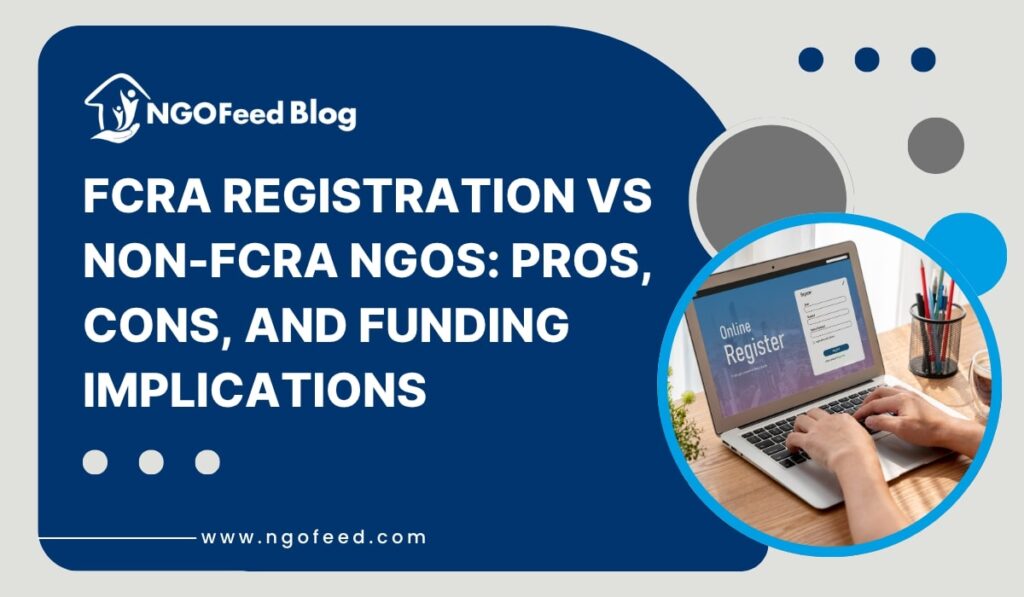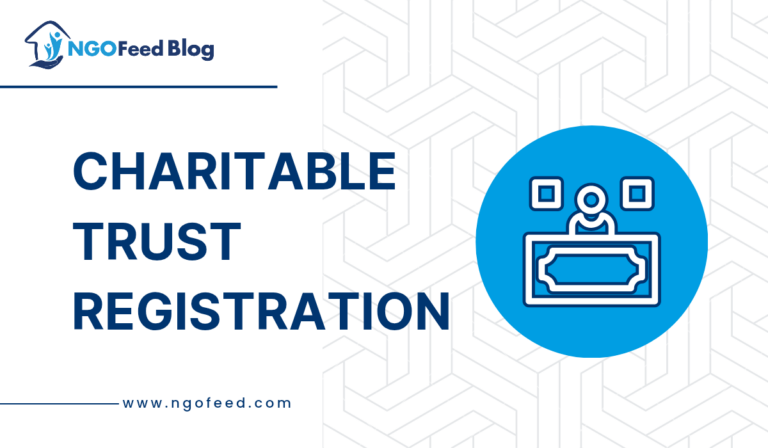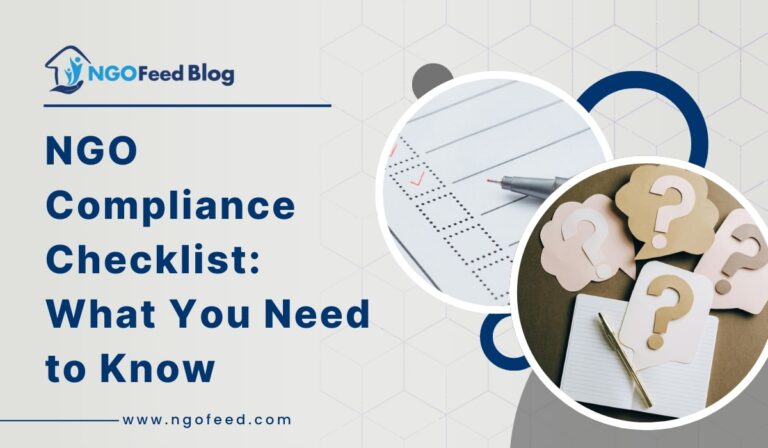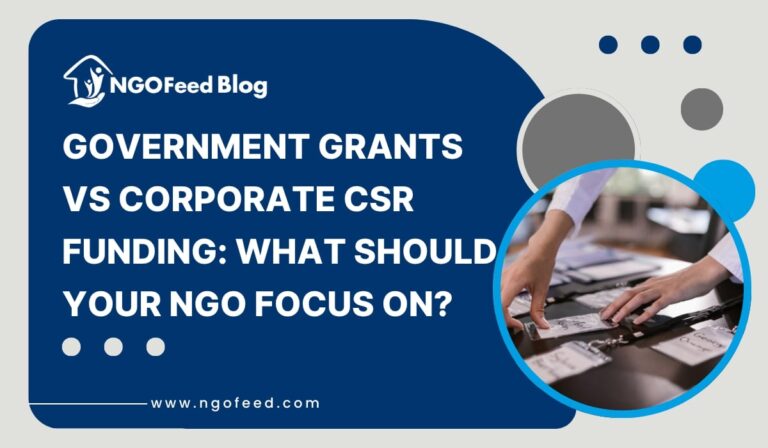FCRA Registration vs Non FCRA NGOs: Under several legal systems, non-governmental organizations (NGOs) in India strive to achieve social, cultural, environmental, or humanitarian goals. For NGOs, one of the most important factors is the capacity to get overseas donations. The Foreign Contribution (Regulation) Act, 2010 (FCRA) controls the receipt, usage, and reporting of foreign funds. NGOs can either obtain FCRA registration or work without it, which greatly impacts their funding sources, operational flexibility, and compliance duties. For NGOs to plan strategic growth and sustainability, one must first grasp the difference.
Table of Contents
NGOs registered with FCRA
FCRA registration lets an NGO legitimately accept foreign donations from people, foundations, trusts, or foreign organizations. Any non-profit organization looking for international financing must register.
Also Read: NGO Registration for Religious or Spiritual Purposes
Advantages
- Qualified to get contributions from foreign trusts, embassies, and overseas donors.
- Registration strengthens credibility since it shows adherence to government regulations, therefore building trust.
- Extended Network: Opportunity to work with worldwide NGOs, UN entities, and international CSR campaigns.
- Project Diversity: Ability to launch bigger initiatives because of greater financing.
Disadvantage
- Annual FCRA returns (Form FC-3) must be filed by NGOs outlining foreign gifts and expenses.
- Restrictions: Foreign gifts must be received only into a designated FCRA bank account.
- Government Audits and Supervision: Under audits and regulatory control; failure to comply might cause registration suspension or termination.
- Time and Expense: Getting and renewing FCRA registration calls paperwork, administrative effort, and processing costs.
Financial Consequences
- Registration with the FCRA opens up foreign personal donations, CSR funding from multinational corporations, and grants from around the world.
- Lack of FCRA registration limits funding only to local sources, therefore limiting large-scale program execution and development.
Also Read: NGO Registration Under Indian Trust Act: A Beginner’s Guide
Non FCRA NGOs
NGOs without FCRA registration use local fundraising efforts, government grants, corporate social responsibility (CSR) donations from Indian businesses, and individual donations as their funding sources.
Pros
- Simplified Compliance: Regular auditing and accounting methods will do instead of having to adhere to FCRA-specific reporting.
- Reduced regulatory scrutiny compared to FCRA-registered NGOs lowers administrative burden.
- Emphasizing local funding promotes the development of solid local relationships and community-based support.
Cons
- Unable to legally accept foreign contributions, reduced financing restricts financial growth prospects.
- Limited project scope: Smaller operational budgets may restrict a program’s geographic reach or scale.
- Compete for constrained CSR monies and government grants in the competitive domestic market.
- Some contributors and partners may see lack of FCRA registration as a low level of credibility.
Financial Implications
- Funding comes from local sources: Indian CSR contributions, government programs, community donations, and membership fees.
- Direct access to foreign foundations or international donor funds is not possible, which might impede growth or international cooperation.
Key Considerations for FCRA Registration vs Non FCRA NGOs
| Aspect | FCRA-Registered NGO | Non-FCRA NGO |
|---|---|---|
| Foreign Donations | Allowed | Not allowed |
| Compliance | Strict; annual reporting | Moderate; standard accounting audits |
| Bank Account | Designated FCRA account | Any bank account |
| Credibility | High; recognized internationally | Moderate; domestic reputation only |
| Funding Sources | Domestic + international | Domestic only |
| Administrative Burden | High | Low |
| Project Scale | Can be large and multi-region | Typically, small to medium |
Also Read: How to Choose the Right Name for NGO
Strategic Consequences
- Those NGOs targeting foreign collaboration or major humanitarian operations should seek FCRA registration.
- NGOs with local emphasis or community-based projects can run effectively without FCRA registration.
- To preserve reputation and legal compliance, even NGOs registered under FCRA need to be transparent and quick reporting.
- Under the Companies Act, 2013, non-FCRA charities can still use corporate social responsibility initiatives; however, they must be inventive in local fundraising.
Also Read: Trust Vs Society Vs Section 8
Conclusion
The operational reach, financing possibilities, and compliance requirements of an NGO depend on the decision between non-FCRA status and FCRA registration. Although FCRA registration provides avenues for foreign financing and international projects, it calls for rigorous reporting and regulatory monitoring. On the other hand, non-FCRA NGOs have easier compliance and concentrate on local funding but have difficulties growing their activities and obtaining international funding. Strategic registration decisions must match the NGO’s mission, target audience, and long-term development goals.
Also Read: Common Mistakes to Avoid During NGO Registration
Frequently Asked Questions (FAQs)
What is FCRA registration, and who needs it?
FCRA (Foreign Contribution Regulation Act) registration is mandatory for NGOs in India that wish to receive foreign donations or grants. Any society, trust, or nonprofit planning to accept contributions from abroad must obtain FCRA registration from the Ministry of Home Affairs (MHA).
Can an NGO operate without FCRA registration?
Yes. NGOs can operate without FCRA registration using domestic funds such as Indian individual donations, corporate CSR contributions, membership fees, or government grants. However, they cannot legally receive foreign contributions.
How does an NGO apply for FCRA registration?
Steps to apply:
Register the NGO under a valid legal structure (Trust, Society, or Section 8 Company).
Apply online on the MHA FCRA portal with required documents: registration certificate, PAN, charter of the organization, governing body details, and annual reports.
FCRA approval typically takes 6–12 months.
Are there any restrictions on foreign funds?
Yes, FCRA-registered NGOs must:
Receive foreign contributions only in a designated FCRA bank account.
Use funds strictly for the approved objectives of the NGO.
Submit annual FCRA returns (Form FC-3) detailing receipts and expenditures.
What are the consequences of non-compliance with FCRA?
Penalties or fines may be imposed.
FCRA registration can be suspended or cancelled.
Misuse of funds may attract legal action, including imprisonment.









